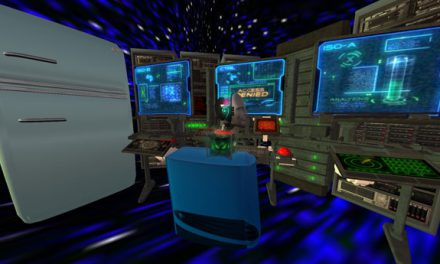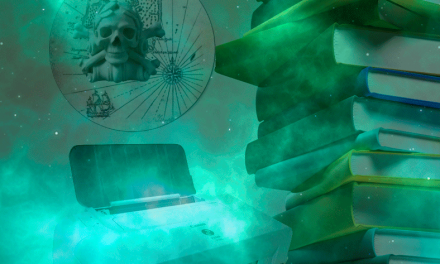 Flower Consultant
Flower Consultant
By Olga Godim
“Grandpa.” Katya hugged the old man who had just come through the customs. “Welcome to Nibelung Space Station. How was your flight?”
“Uneventful.” He hugged her back. “Hello, Kitten.”
“Let me show you around. This is your first visit to a space station?”
“First space ship too.” He glanced at the luggage cart with his two suitcases. The little plastic basket on wheels faithfully rolled after them, its electronic signals flashing blue. Katya tugged her grandfather down the corridor towards the lifts, and the cart followed.
“Shouldn’t we take the bags home first?” he asked.
“No. I’ll just program the cart to deliver the bags to my home.”
She stopped in front of the freight conveyer, typed the required information into the cart’s onboard computer, and pushed it onto the crawling conveyer belt. The cart promptly got lost behind dozens of similar carts, all heading towards the black mouth of the sorting office.
“It’ll be waiting for us at home.” She grinned at the old man’s surprised look. “Everything is automatic. You’re not tired, are you?”
“No. Let’s see your station. Lead the way, Katenka.”
Katya started her guided tour with the public levels of the station. “To the left are the government offices, each one decorated with the Federation symbol. To the right is the new opera theater, and you can see our old music amphitheater behind the art galleries.”
“Art galleries. Plural,” he said thoughtfully as he trod after her. “I like art galleries. And what are those? Not art galleries too, surely?” He gestured at the block of garish buildings along the promenade. “They look like a fractal. Many fractals.” His eyebrows climbed up. “Their colors hurt my eyes.”
Katya laughed. “These are alien embassies.”
“Ah. What about that one? A service shed?” He pointed at the gray featureless facade at the end of the embassy row.
“That is the Vergacian embassy.” She winced. “The latest one.”
His lips pursed. Simultaneously, they turned away from the drab building, as if they had rehearsed the maneuver. A year ago, on the last day of the war with Vergacians, their warship had blown up Katya’s mother’s small commercial vessel. Everyone on board had been killed. It was one of the senseless cruelties of the war, perpetrated just as the peace treaty had been signed. Since then, Katya had come to terms with her mother’s death. She didn’t hate Vergacians anymore but she couldn’t bring herself to like them either.
“Katyusha, these folks are Vergacians?” Grandfather asked softly.
She followed his gaze to a couple of Vergacian clerks, both about half her grandfather’s height, hurrying towards the gray embassy door. With their gray skin, large heads, and small flexible horns, the creatures in their gray robes looked like ghosts floating past the gaudy alien architecture.
“Yes,” Katya said.
“Why are they so gray? Gray skin, gray clothing, gray embassy.”
“The report said their star emits some funky rays that prohibit colors. Everything on their planet is gray: plants, animals, minerals. That’s why all their clothing and machinery are gray. They probably can’t see colors.”
“Poor chaps—living without colors.”
“Poor chaps?” Katya huffed in disbelief. “Let me show you some colors, grandpa.” She tugged him away from the unrelieved gray of the embassy, towards her favorite place on the station, the biggest space station park in the galaxy, the Rings of Nibelung.
As they walked, Grandfather plied her with questions about her plans for the future.
“I don’t know,” Katya said. “Before mom died, I thought I could be a spacer like her, but now, I’m not sure. I don’t know what I want. I’m drifting. Mom had some savings, and I’m taking part time jobs in retail. I’m doing okay for money, but long term—I just don’t know.”
“Come to Earth with me. There are more options there than on the station. Many big universities.”
“Maybe, although I don’t have money for a big university. Maybe a college. If I knew what I wanted . . . You’ll be here for a while, so I’ll have time to decide.”
He didn’t press. They stepped off the elevator in front of a graceful arch, entwined with milky flowers and varicolored clematis leaves.
“Everything is real: flowers, grass, shrubbery,” Katya boasted, glad to change the topic. Her heart swelled with pride for her station. “The bird songs are a recording though,” honesty compelled her to add.
They trudged beneath the birds’ trills, passed a tiny pond, clogged with water lilies, topped a grassy knoll, and stopped before a golden sign. “Artists’ Circle,” read the red cursive letters. In the square behind the sign, surrounded on all sides by flowerbeds, artists displayed their paintings.
“The art exhibition of the Fifth Ring of Nibelung.” As always, Katya felt buoyed by the beauty of the place, as if she was the one who had created it all. “The best gallery on the station.”
“Marvelous.” Grandfather ducked under the sign toward the paintings.
Katya followed, but her elation dimmed, when she spotted a few gray Vergacians meandering among the paintings. They seemed shadowy and insubstantial next to the flamboyantly garbed humans. “No. They even penetrated the Rings,” she muttered in disgust.
****
All the way from the park, Grandfather rubbed his hands and hummed absently. When they came home, he made his announcement. “I want to sell my paintings in the Artists’ Circle.”
“You paint? You’re a retired electrician.”
“The two are not mutually exclusive,” he said haughtily; then spoiled the effect by chuckling. “I started painting seriously after I retired.”
“And you brought your paintings with you?”
“Yes. They don’t weigh much. Go check where I should register while I unpack.”
Katya settled at the computer, scanning the station net. When he called her some time later, she scampered to his tiny guest room. Inside the room, painted flowers bloomed. They covered the bed and the nightstand, spilled over to the floor, and hung from the bookshelf.
“Grandpa, this is great. I love them.” She marveled at the flood of colors in the room, so contrary to her grandfather’s dry, sarcastic ways. “There are more than fifty paintings here.”
He beamed at her. “I work fast.”
Katya shook her head. “Grandpa, the pictures are wonderful. Unfortunately, you can’t sell them in the Artists’ Circle.”
“Why not?”
“Only permanent citizens of the station can apply for a permit.”
His face fell. “That’s a drawback. Could you apply? You’re a citizen.”
“But I can’t paint,” Katya objected. “I’m not an artist.” She loved art, took classes in art history, but she couldn’t paint to save her life.
“Nobody would know,” he cajoled. “I’ll come with you to sell the paintings, and if anything sells, we’ll share the profits.”
“Grandpa, stop. I can’t cheat the rules.”
“Why not? They don’t make sense. If the rules are stupid they should be broken. Nobody would be harmed. You don’t steal anything from anyone if you say you’re an artist. There is still an artist and a citizen in this circuit, only they are split between two persons.”
Katya shook her head at the devilish gleam in his eyes. “Okay. Fine. I’ll do it. But if anyone finds out…”
“The blame will be totally mine. Don’t worry, Katyusha. Nobody will be the wiser.”
Katya eyed him doubtfully, but Grandfather’s enthusiasm was contagious. Perhaps he was right. Nobody would be hurt, and her grandpa would be happy, so why not. She grinned and settled at her computer again, filling forms and transferring the license fees. “Whatever,” she murmured. “Bureaucrats should be tricked; that’s what they exist for.”
“That’s the spirit.” He cackled.
As if in reply to their banter, the machine spit out a golden plastic permit, with her name in the same cursive red letters as on the big sign in the Rings.
She grabbed the little card and flourished with it. “I’m an artist now, grandpa; it’s official, in red.” She dissolved into giggles. Grandfather smiled indulgently.
The next day, they carted his paintings to the Circle. A couple hours later, a tall sandy-haired painter started a round of friendly visits from the resident artists of the park.
“Hello. I’m Stilek,” he introduced himself. “I paint clowns. Welcome to the Circle.”
“Hello, Stilek,” Katya said. “I’m Katya. This is my grandfather, visiting from Earth. He’s keeping me company.”
The men shook hands. Then Stilek examined Grandfather’s paintings. “Great job, Katya,” he approved. “Your palette is dazzling. The perception of youth, I suppose. Although, you should pay more attention to composition. And deepen the perspective in the background, give it more air.” He indicated the places with a long finger.
Grandfather’s lips twitched, as he absorbed the advice.
“Thank you.” Katya smiled politely. She had never thought of this aspect of their escapade: they were deceiving not only the station bureaucrats but the honest artists as well, but it was too late to back out now.
“Hello. I’m Maya,” said a short, black-haired woman behind Katya’s back.
Katya jumped guiltily. “Hi,” she squeaked.
“I didn’t mean to startle you, dear. I paint cityscapes.” Maya pointed to her ocher-dominated rooftops and chimneys. “Don’t listen to Stilek. He criticizes everyone. You’re so young and have already done so much. Your brushstrokes are lambent. I see a hand of a future master. Floral aestheticism?”
“Ah, yeah, to a degree,” Katya hedged, a wave of heat flooding her cheeks.
“Nothing to be embarrassed about, dear.” Maya made a few technical comments, which Grandfather sucked up like a sponge, before returning to her roofs.
“Grandpa, I feel like a lying rat,” Katya whispered. “I’m going to roam around.”
She dragged her feet to a coffee shop. Maybe an éclair would relieve a sour taste of deception in her mouth. Before she reached the door, a young couple caught her attention. They were striding purposefully from one craft booth to another.
Katya sidled closer. “Looking for a souvenir from Nibelung?”
“Yes,” the girl said eagerly. “To commemorate our honeymoon.”
“Come with me.” Katya towed them back to her grandfather’s paintings. She was already here. Why not try to sell something. She had always been good at sales. Every shop manager of every shop she had ever worked for said so.
“Look. These peachy daisies, festooned with vine leaves, might be what you have in mind,” she declared, as if gripped by inspiration. “In many old European myths, daisies personified health, and vine meant joy. Both are excellent for a young couple.”
“Right!” the girl exclaimed. “Perfect! So original. How much?” Her fingers caressed the gilded arabesques of the oval frame. “We’ll hang it over our bed.”
Her young husband hurriedly fished out his wallet, his ears flaming.
“Sold,” Grandfather said in wonder.
The rest of the Circle applauded and called out encouragements.
Katya squirmed. These artists were so nice and helpful, like a real community, and she was cheating on them. She hated the feeling.
Setting another painting in place of the daisies, Katya glanced at the two Vergacians who strayed aimlessly among the pictures. Their horns rotated furiously, like fat little antennas. They appeared drawn to her grandpa’s flowers. Maybe they could see colors after all?
“I wish someone would incite my customers the same way,” Maya said wistfully. “I’m just not a salesperson.”
Katya stared at her. As far as she knew, the woman hadn’t sold anything recently. “I might try,” she murmured. Yes, that was the solution to her guilt pangs. If she helped the others sell their paintings, then her small lie wouldn’t matter. Full of the new purpose, she examined the idlers around the Circle. Who would be likely to buy Maya’s roofs?
She zeroed in on a tall women ambling alongside the Vergacians. When the woman returned to Maya’s cityscapes for the third time, Katya slid closer.
“Wonderful roofs, aren’t they?” She pointed at one of the larger pieces.
“Yes,” the woman said uncertainly. “I’ve never seen the like.”
“Where are you from?”
“Mars Colony. Our building tops are flat or round. These are all sharp angles.”
“This artist is from Earth,” Katya whispered in confidence. “See the charm of ancient Europe in this forest of chimneys? They’re authentic. And so cheap.”
Maya’s eyes almost popped out as he listened to Katya’s marketing fantasies.
“You’re right.” The woman sounded as if she just discovered Earth by herself. “I’ll buy it.” She reached into her purse.
Katya retreated, watching the transaction from behind her grandfather’s back.
“That’s a doozy,” Maya said after her buyer vanished from view. “I’ve never been to Earth.”
Katya shrugged. “Neither has she.”
“Would you take commissions, Katya? Ten percent?”
Katya opened her mouth to refuse, but Grandfather intruded. “Of course,” he said in his deep bass. “Ten percent is fair.”
Katya blushed but didn’t contradict him. “Thanks,” she said shyly.
“Thank you,” Maya responded.
By the end of the day, Katya sold one Stilek’s clown and another of her grandfather’s paintings, bringing the total number to four. All the way home, she couldn’t stop smiling.
“We’ll be rich, Katerina,” Grandfather remarked cheerfully after dinner, as he transferred half the profit to Katya’s personal account. “Go buy yourself something. You deserve it. Are the shops still open?”
Katya nodded. She felt upbeat, the faint sadness that had pressed her down since her mother’s death finally lifting. “Yes, all the stores are open till midnight. Only the Rings close early for maintenance. Want to come with me, grandpa?”
“No. I’m tired. I’ll read before bed. Go have fun.”
Katya went. She needed time alone to think. For the last year, she had avoided any planning for the future, but Grandfather was right. She had to figure out what she wanted. She couldn’t dawdle forever. Absently, she wandered from the brightly-lit promenade into the shopping arcade, gazing in the shop windows but seeing nothing.
During the station evenings, most people gravitated towards the strobing lights of the promenade with its restaurants, clubs, and theatres, but she liked this maze of small bargain shops better. The light was dimmer here, and fewer shoppers patronized the establishments.
A Vergacian brushed past Katya, swinging his hand that clutched a weird gray crystal with shining silvery inclusions. The crystal almost hit her nose.
“Hey, watch it,” she muttered, grimacing at the odd smell. Then a great weight settled on her shoulders, and her eyelids closed.
****
When she opened them again, she was in a different place. She was lying on a low comfy pallet in a small gray room. Soft gray light streamed from a ceiling fixture. Quiet music played in the background. The blanket covering her was as gray as the walls. Katya’s blue jeans and a pink blouse were the only spots of color in the otherwise bland gray room.
She jumped up, her heart thumping widely. The last thing she remembered was a Vergacian with his stinking crystal. Had Vergacians kidnapped her? Why? Was she inside the Vergacian embassy? On a Vergacian ship? How long ago?
Nauseous with dread, she pivoted, glaring at the offensive gray sameness of the walls. They all looked identical, made up from universal gray panels, divided by the darker gray strips. Which panel was the door? Was she locked in? Before she started pounding on the walls at random and screaming for help, one of the panels slid aside, revealing a Vergacian. His robe was the same gray as every other Vergacian wore, but the material seemed shinier, weighed down by the elaborate silvery embroidery.
His flexible horns, bigger than she had seen on a Vergacian before, didn’t rotate. They stood up proudly, as he bowed to her.
“Miss, I’m the Vergacian ambassador,” he said in careful English. “I welcome you to the Vergacian embassy on Nibelung Space Station. We would like to ask for your help.”
Katya swallowed her agitation. The ambassador. He seemed non-threatening, and he was half her size, but he probably wasn’t alone. His guards armed with laser rifles must be close by. She should tread carefully. It could develop into a potential interstellar conflict, if she didn’t handle the situation right.
“You kidnapped me,” she said, trying to ignore the fear churning in her belly. “If you wanted to ask for my help, you could’ve asked without smuggling me into your embassy.”
“Yes,” he said. “My apologies. My officers were too . . . eager to carry out my orders.”
His antennas rotated slowly. Was it a sign of guilt? Irritation? She needed lessons in the Vergacian facial expressions if she didn’t want to get her station and herself in trouble. No, strike that—in the Vergacian antenna expressions. Somehow, despite his small stature, his funny antennas, and his pretended meekness, this little guy was scary. Katya shivered and hugged herself to stop the tremors. “What is it you want from me?” she asked in a small voice.
His antenna shrunk suddenly. “It wasn’t my goal to scare you, Miss,” he said. “I wanted to hire you for a job.”
“What job?”
“I wanted you to make . . . bright images for my embassy.”
Katya’s brows climbed up, and her lips parted. He wanted her to paint pictures?
“I saw your display in the park. Those images of yours were . . . the most . . . .”
He seemed to have trouble articulating his impressions, but Katya didn’t share his predicament. His language probably lacked the words for colors, but English sported many color adjectives.
“The most brilliant,” she offered helpfully. Her grandpa’s paintings were definitely the brightest compared to the ocher roofs of Maya’s and Stilek’s pastel clowns.
“Yes,” he said.
“So you can see colors?”
“Yes, but it . . . they don’t exist on our planet. I want them in here. I want my scientists to study them, so we can produce them at home. They were so . . . gorgeous.” He breathed the last word, his expression reverent, almost worshipful.
The Vergacians wanted her to paint flowers for them. It was so ridiculous, she would’ve laughed if she were not so afraid. What would happen, if she told them that she couldn’t paint, that it was her grandpa who was an artist? She doubted the old man would react well to this fiasco. Neither would this guy, the ambassador. Neither would the station officials, who would doubtlessly be informed. She was in a pickle. Could she bluff herself out of this screw-up?
“We will pay you handsomely,” the ambassador added into Katya’s silence, “and we will finance all the materials you need, of course. You are not a prisoner here. I just want you to make . . . what do you call those things?”
“Paintings. Art,” Katya said.
“Yes, art. How much time would you need to make art for my embassy?”
“It depends. How many paintings do you want? And I need to see all the rooms you wish to have paintings for,” she added. Perhaps there was a way out for her.
“Please, come with me,” the Vergacian said.
Katya trooped after him through the embassy’s relentless gray space.
“I’d like to have art in every room, private and public,” he confided. “Here. And here.” He pointed at one wall after another. It seemed he wanted a painting for almost every wall.
“That’s a huge project,” she said. “It will probably take me months. Do you want larger paintings for the public halls?”
“Could they be different sizes?”
“Yes.” She grinned at her unfolding idea. Of course, she couldn’t paint, but she didn’t have to wield a paintbrush to make this place look amazing. She knew art and artist. Her favorite classes at school had been in art history. She could give these gray creatures all the flowers they wished, from all the centuries of human art. The images were all available on the station net.
And she would get paid handsomely too, enough to finance her education. Suddenly she knew what she wanted to study. She would major in art history and gallery management. And she would have this project as her portfolio—the first art gallery in the history of Vergacians. The scope of it took her breath away.
“I think we should start with Van Gogh’s sunflowers in front of the entrance door,” Katya said. “The visitors will see them as soon as they enter the embassy. They’ll set the tone, and then we’ll go from room to room, from century to century. You don’t mind giclee prints on canvas, do you?” Mischievously, she dropped a few more artists’ names from the past centuries as she expanded on her vision.
“Ah,” said the Vergacian, obviously lost in her artistic speculations.
“Good. I will draft a contract for us,” Katya said brazenly. “It will outline all the paintings, artists, and sizes I would need to produce. I’ll have to come back to measure the exact sizes of all the places where you want the paintings. For the smaller private rooms, we can even use the original canvases of my…” She started to say “grandfather” but stopped herself in time. “My original canvases,” she amended smoothly. She would sell them everything of her grandpa’s, if he didn’t object. And if he did, she would photocopy them, just like Van Gogh.
“When I’m done, you will want to have an open house, to showcase your beautiful embassy. It will be amazing, like a museum of human floral art.” She already had a preliminary plan in her mind, what should go where, but she needed time on her computer to collect the images. “I have to do more research before I start, but for now, I’ll give you the list of equipment we would need. You can buy it or we can rent it for the job. We need an industrial printer for the images and a 3-D printer for the frames. You want the old-fashioned gilded frames?”
Mutely, the Vergacian stared at her.
“I’m overwhelming you, am I? I’m sorry. I love art so much. It’s so wonderful to have a free hand. You still want it done, right?”
“Yes,” he said faintly. “I think we have chosen correctly.”
“Thank you.” Katya beamed. “I’m going home now but I’ll be in touch. I’ll come tomorrow to measure the walls and a few days later with the contract. I need to consult a lawyer.” And her grandpa.
“Of course,” said the ambassador.
****
A few days before she and Grandfather left the Nibelung Space Station for Earth, so Katya could enroll in Oxford, the Vergacians held an open house. Katya hosted the vernissage alongside the ambassador. She even ordered a special dress made of black silk, decorated with gray sequins, almost like the Vergacian ambassador. The dress was prohibitively expensive, but for once in her life, she could afford it. The generous fees the Vergacians paid for her art consultancy fully covered her education and even had a little left over for fripperies.
The news of the event spread across the galaxy, and Katya gave several interviews to the interstellar media outlets. In all of them, she called herself the first art consultant in the Vergacian history. Maya and Stilek came to the opening night. Nobody ever figured out that she couldn’t paint.
Olga Godim is a writer from Vancouver, Canada. Her short stories have been published in multiple internet and print magazines. Her fantasy novels ALMOST ADEPT and EAGLE EN GARDE were released in 2014 by Champagne/Burst. In 2015, EAGLE EN GARDE won EPIC eBook Award in the Fantasy category. Her website: https://olgagodim.wordpress.





Wonderful story! Loved the ending.
Great story. I love sci-fi, and I love art too, so found this really interesting.